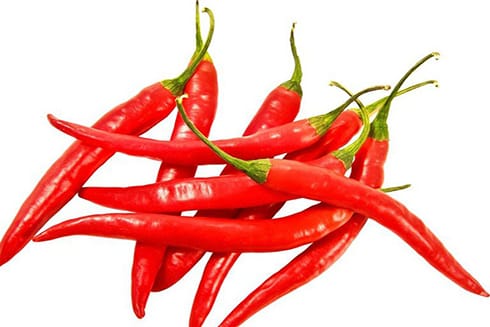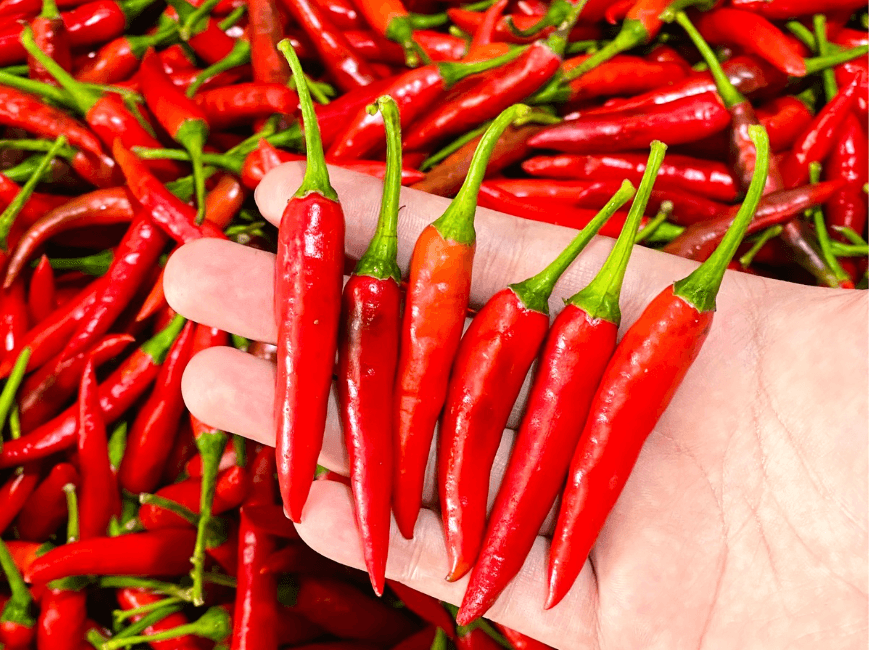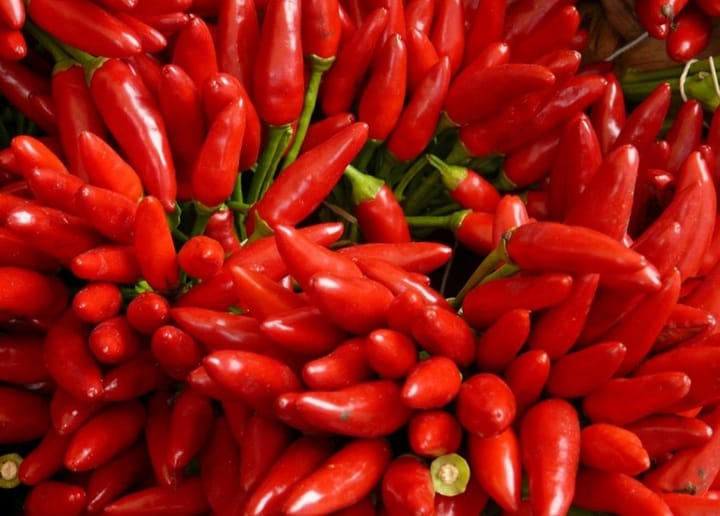Chili – a small spice but has explosive power in both flavor and health benefits.Not only does it enhance the taste of your meal, chili also has a series of surprising uses that you may not know. So,the effects of chili what is it really? Is eating chili good or bad? Why are so many people “addicted” to its spicy taste?
Join Viot Minh Trang through the wonderful benefits of this bright red fruit to better understand why chili is not only a spice but also a precious “medicine” in modern life.
1. Supports weight loss and increases metabolism
Chili peppers are widely known for their ability to aid weight loss and boost metabolism.substances in the body, mainly thanks to the compound capsaicin.
According to Public Health, capsaicin “promotes the burning of more fat and calories than you take in” and reduces appetite.Community Health. A study by VIAM also showed that supplementing 6mg of capsaicin/day helpsreduce belly fatafter 12 weeksvienyhocungdung.vn.
Capsaicin is the ingredient that gives chili peppers their spiciness, and it has been shown to generate heat in the body, promoting the burning of calories and fat. When you consume chili peppers, your body temperature can increase slightly, stimulating your metabolism to work faster.
In addition, capsaicin also helps reduce appetite, especially reducing the desire to eat foods high in fat and calories, thereby supporting the control of food intake and contributing to effective weight maintenance or loss.
2. Improve digestion and resistance
Chili peppers not only stimulate the taste buds but also have a positive effect on the body’s digestive system and immunity. The spiciness of chili peppers can stimulate the production of gastric juice in the stomach, helping the digestion of food to proceed more smoothly. Although some people may feel uncomfortable, in the right dosage, chili peppers can promote intestinal motility, reduce indigestion and constipation.
Besides, chili is rich in vitamin C., a powerful antioxidant and essential nutrient for the immune system. Vitamin C helps increase the production of white blood cells, strengthening the body’s defenses against viruses, bacteria, and other pathogens.
- According to USDA source, 100gchili pepperscontains about242 mg vitamin C, which is nearly 3 times the recommended daily intake (RDA 90mg/day).
- Another data recorded: 100graw green peppersprovide approx.130 mg vitamin C .
- If you eat just 1 medium hot pepper (~45g), you have consumed about65 mg vitamin C– equivalent to 72% of daily body needs.

Improve digestion and immunity
Compounds in chili peppers also have mild antibacterial properties, which may help protect the gut from certain harmful bacteria.
3. Natural pain relief and anti-inflammation
One of the most notable effects of chili peppers, especially capsaicin, is its pain-relieving and anti-inflammatory properties. Capsaicin works by acting on pain receptors in the body, reducing pain signals to the brain. For this reason, capsaicin has been widely used in medicine to produce topical creams, patches, or gels to relieve pain in conditions such as arthritis (especially osteoarthritis), muscle pain, nerve pain, and even pain from shingles.
The anti-inflammatory properties of capsaicin also help reduce swelling and discomfort in affected areas, making chili peppers a potential natural remedy for managing chronic pain and inflammation.

Natural pain reliever and anti-inflammatory
See now:
Update the latest export chili price today
4. Cardiovascular protection to reduce cholesterol
Eating chili peppers properly and in moderation can have significant benefits for heart health. Studies have shown that capsaicin and other antioxidant compounds in chili peppers can help reduce levels of bad cholesterol (LDL) and triglycerides in the blood, which are major risk factors for atherosclerosis and heart disease.
In addition, chili peppers are also believed to improve blood circulation by dilating blood vessels and preventing blood clots. This helps reduce pressure on the heart, maintain stable blood pressure and protect the circulatory system from damage. Thanks to these effects, chili peppers contribute to maintaining a healthy heart and reducing the risk of cardiovascular diseases.

Protects the heart and reduces cholesterol
See now:
Discover the spicyness of vietnamese chili: Are Vietnamese chili the spiciest?
5. Side effects of abusing chili
Although chili peppers have many benefits, overuse or overconsumption can lead to some unwanted side effects. The heat of chili peppers can cause a burning sensation in the mouth, throat, and digestive tract.
For people with sensitive stomachs or conditions such as stomach ulcers or acid reflux, eating too much chili can cause irritation, stomach pain, nausea, diarrhea or worsen the condition.
In addition, some people may be allergic to chili, manifested through symptoms such as rash, itching, swelling or difficulty breathing. Therefore, chili consumption should be moderate and suitable for each individual’s physical condition to avoid negative effects on health.

Side effects of chili abuse
In short, chili is not just a common spice but also a “superfood” with many beneficial effects on health and life. From supporting weight loss, improving digestion and boosting immunity, to pain relief, anti-inflammatory and cardiovascular protection, chili is a great addition to the daily diet. However, to maximize these benefits and avoid side effects, it is important to eat chili in moderation, choose the type of chili that suits your tolerance for heat and use the right dosage.





Tác giả Tưởng Mạnh Biên
Là chuyên gia giàu kinh nghiệm trong lĩnh vực xuất khẩu nông sản. Với nhiều năm làm việc, nghiên cứu và trực tiếp tham gia vào các hoạt động sản xuất, kinh doanh và xuất khẩu nông sản, tác giả chia sẻ những kiến thức chuyên môn sâu sắc cùng các bài học thực tiễn giá trị nhằm hỗ trợ doanh nghiệp.
- Địa chỉ: Số 27, Tổ 23, Lĩnh Nam, Hoàng Mai, Hà Nội
- Email: viotvietnam.vn@gmail.com
- SĐT: 0977 728 269